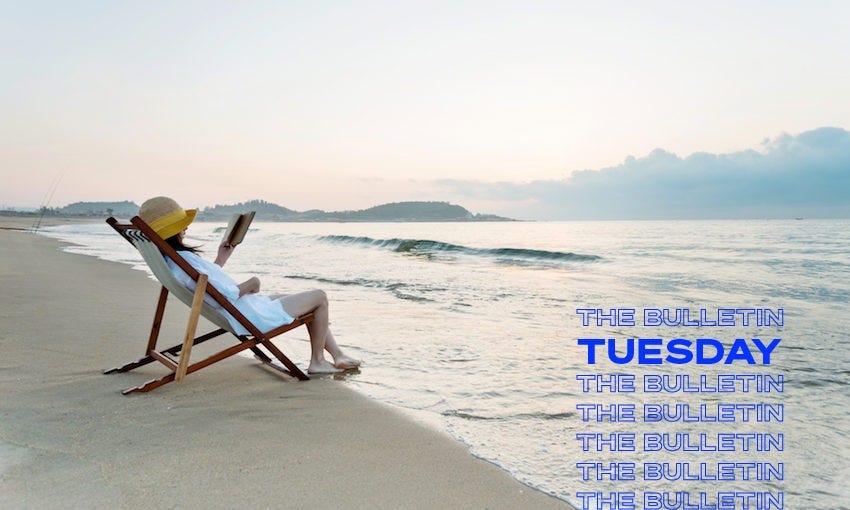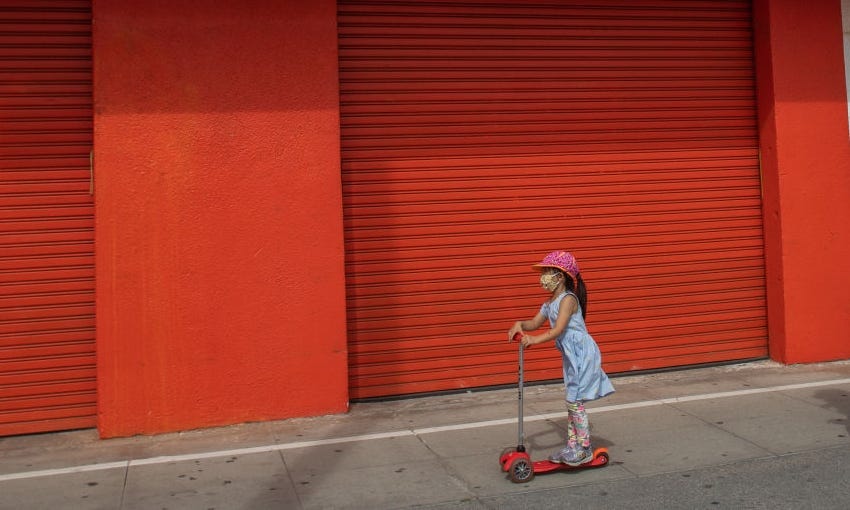Saving the New Zealand summer
Vaccination levels will need to increase rapidly for the entire country to reopen (for the fully vaccinated) by Christmas
Mōrena and welcome to The Bulletin for Tuesday, October 26, by Justin Giovannetti. Presented in partnership with Z Energy.
In today’s edition: Public health neglect contributed to delta; how the bright-line test is faring; drug-checking to be made permanent; but first, how to secure NZ’s summer.
A taste of summer freedom. (Getty Images)
The race for Christmas. The prime minister told Stuff over the long weekend that she hopes fully vaccinated Aucklanders carrying vaccine passports will be able to travel in and out of the city before the end of the year. Until vaccination levels climb, the hard border cutting the region off from the rest of the country will remain in place. Jacinda Ardern unveiled a new traffic light system on Friday that will eventually replace the alert levels. This helpful explainer from The Spinoff’s Alice Neville is worth a read if you haven’t done so already.
Central to the new plan is a 90% double vaccinated target for all DHBs. It’ll be a confusing few weeks or months before the entire country finds itself back on the same Covid-19 alert system. Auckland is working its way through a bespoke level three and it could graduate to the new traffic light system first. To get to a long promised “classic Kiwi summer” for everyone, hundreds of thousands of New Zealanders still need to get jabbed. In some parts of the country that seems relatively straightforward, in others the sprint to 90% looks more like a crawl. To help increase vaccination levels, the government’s new traffic light plan will introduce permanent restrictions on the unvaccinated once it is adopted.
Getting to the high vaccination levels is now the focus for a green light. Auckland’s three DHBs are expected to hit the target around the end of November, at which point the city could move to the red level. Jo Moir reports in Newsroom that the government is still considering adopting a national freedom day if the vaccination target fails. Moir also revealed that there was a push at cabinet for a separate 90% target for Māori that was ultimately dropped.
Where the conversation is headed. The overall rate of vaccination and the number of doses going to Māori and Pacific peoples is likely to continue to dominate headlines this week. There’s a sliver of hope now, especially in Auckland. However, there’s also concern that 90% overall might not be enough. Here are two experts explaining why:
“It is certainly possible for Auckland, and other regions, to reach the 90% target by Christmas. Whether we do or not depends on details about the last remaining people to get vaccinated–things like how many people are going to refuse vaccination and how easy access is for people who might be willing to get vaccinated but haven’t had good access or incentives until now,” wrote Dion O’Neale, the principal investigator for Te Pūnaha Matatini.
“At the very least, vaccination target details for Aotearoa New Zealand needed to include at least 90 to 95% full vaccinations for Māori and Pacific peoples, to help keep all of our most vulnerable communities safe from Covid-19, and that includes keeping our children and young people safe,” wrote Dianne Sika-Paotonu, an immunologist at the University of Otago.
“Leaving any of our most vulnerable behind and unprotected, given the adverse health impact already seen for vulnerable groups in Aotearoa New Zealand, will have consequences that will be far reaching and will speak to generations to come,” she wrote in a comment for the Science Media Centre.
A message from The Spinoff publisher Duncan Greive
We’re rapidly approaching 10 weeks in lockdown here in Tāmaki Makaurau, and still unsure when a more recognisable form of living will resume. Which means that for the foreseeable future our staff will be working to bring you the latest from the delta outbreak—and to distract you from it—in a situation with a considerably reduced commercial foundation. This makes us more reliant on our Members than ever. To those who have contributed, a huge thank you from all of us. To readers who enjoy our work and have yet to join The Spinoff Members, please consider doing so today if your circumstances allow it. Head here to donate, or to find out more.
Decades of public health neglect fuelled delta outbreak. Breaking his silence as the head of the government’s Covid-19 advisory group, epidemiologist Sir David Skegg told the NZ Herald (paywalled) that the country’s public health system wasn’t up to tackling delta. It’s a revealing interview and Skegg is concerned that the country’s underfunded health system won’t be able to cope with the “new abnormal”.
Looking forward: With over 100 Aucklanders now self-isolating at home after testing positive for Covid-19, the government is expected to announce changes at the border this week. Ministers might indicate that it no longer makes sense asking fully-vaccinated returnees to spend a full fortnight in MIQ in the current situation.
The Covid numbers: There are 35 cases in hospital (a sharp reduction from 50 on Sunday) and 5 in ICU/HDU. There are now 1,225 active cases in New Zealand (the first time this number has gone over 1,000). 103 new community cases were reported in Auckland yesterday, 4 in Waikato and 2 in Northland. 18,985 people were vaccinated on Sunday.
The Spinoff’s Covid data tracker has the latest figures.
The expanded bright-line test is hitting only 3% of house sales. The tax was extended this year to require sellers of residential investment properties to pay income tax on a capital gain if they owned it for less than a decade. As Stuff reports, the low proportion of sales captured by the test doesn’t mean it isn’t working. The number of homes being flipped seems to be falling and owners are exempt from the tax on their main property. The IRD estimates that 85% of people who fall under the bright-line test are declaring the income correctly.
Drug-checking at summer festivals will be funded again this year. RNZ reports that demand for the service soared last year, so the government is putting up $800,000 to fund it nationally. The programme looks likely to be permanent from now on. The first year showed how useful it can be. It found that 40% of what people thought was ecstasy was in fact a potentially dangerous drug known as bath salts. About 68% of festival-goes changed their behaviour after the results came in.
Auckland’s population fell last year, a first since record-keeping began. Despite a closed border, the population in most regions of the country still grew last year by about 0.6% on average. Auckland was a rare exception, according to Interest. The city’s population should have increased by 12,900 as births outpaced deaths, however 14,200 people left Auckland for elsewhere. After growing above the national average for the past two decades, Auckland is a slightly smaller city today than a year ago.
The odd but important election Aucklanders can vote in right now. An Entrust ballot paper is probably in your letterbox or on your kitchen bench if you live in Auckland. For most people in the city, it’s likely already in the garbage. Fish it out because you’ll want to vote after reading Justin Latif’s story in The Spinoff about the fascinating power struggle and real dilemma at the centre of the election.
Got some feedback about The Bulletin, or anything in the news?
Get in touch with me at thebulletin@thespinoff.co.nz
What does Covid mean for kids? (Apu Gomes/AFP via Getty)
Right now on The Spinoff: Jin Russell tackles questions about what Covid-19 means for children and how we can protect them. Te Pūnaha Matatini’s modelling team explains how small changes can fuel the spread of delta. Tina Ngata writes about how to prepare for delta in the community. Chris Schulz ranks all the New Zealand TV shows that could be rebooted. Olivia Sisson speaks with a scientist trying to turn our national fungus into the blue food dye of the future.
For a longer read today: How the world ran out of time. With the COP26 summit starting in Glasgow next month, The Sydney Morning Herald looks at how climate change has worsened over the past two years as the world has fixated on Covid-19. From deadly heatwaves in North America, to flooding, forest fires and mudslides around the world, “There is no time left”, the newspaper writes.
The Black Caps face a tough challenger in Pakistan. After Pakistan’s 10-wicket win over India at the T20 world cup, the team will welcome the Black Caps tomorrow in an opening game in the UAE. As Stuff reports, both sides will now have a lot to prove. The match will follow what was viewed as a snub last month when New Zealand’s tour of Pakistan collapsed amid security concerns.
That's it for The Bulletin. If you want to support the work we do at The Spinoff, please check out our membership programme.







